Speakers - Abstracts
+ John X Patriach of Antioch
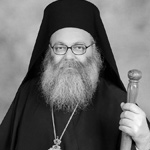 His Beatitude PatriarchJohn X (Yazigi), Patriarch of Antioch and All the Eastis the primate of the Greek Orthodox Church of Antioch. Prior to his election as patriarch on December 17, 2012, he led the Antiochian Orthodox Archdiocese of Europe headquartered in Paris, France. Before his election and enthronement as Metropolitan, he had been titular bishop of Pyrgou (al-Hosn), Syria. He was also formerly the dean of the St. John of Damascus Institute of Theology (Tripoli, Lebanon), the patriarchal seminary attached to the University of Balamand. His Beatitude has a Degree in Theology from the Balamand seminary (1978), a Diploma in Byzantine Music from the Byzantine Music Conservatory in Thessalonica (1981), and a Ph.D. in Theology with a specialization in Liturgics from the University of Thessalonica (1983). While at the Balamand, he served as Professor of Liturgics (1981-2008), as well as in the abbacy of St. George Al-Humayrah Patriarchal Monastery (1993-2005) and the Monastery of Our Lady of Balamand (2001-2005). Since April 2013 his brother, Paul the Metropolitan of Aleppo was kidnapped together with Youhanna Ibrahim, Metropolitan of Aleppo of the Syrian Orthodox Church.His Beatitude is also the author of numerous books and articles on Orthodox theology and liturgics.
His Beatitude PatriarchJohn X (Yazigi), Patriarch of Antioch and All the Eastis the primate of the Greek Orthodox Church of Antioch. Prior to his election as patriarch on December 17, 2012, he led the Antiochian Orthodox Archdiocese of Europe headquartered in Paris, France. Before his election and enthronement as Metropolitan, he had been titular bishop of Pyrgou (al-Hosn), Syria. He was also formerly the dean of the St. John of Damascus Institute of Theology (Tripoli, Lebanon), the patriarchal seminary attached to the University of Balamand. His Beatitude has a Degree in Theology from the Balamand seminary (1978), a Diploma in Byzantine Music from the Byzantine Music Conservatory in Thessalonica (1981), and a Ph.D. in Theology with a specialization in Liturgics from the University of Thessalonica (1983). While at the Balamand, he served as Professor of Liturgics (1981-2008), as well as in the abbacy of St. George Al-Humayrah Patriarchal Monastery (1993-2005) and the Monastery of Our Lady of Balamand (2001-2005). Since April 2013 his brother, Paul the Metropolitan of Aleppo was kidnapped together with Youhanna Ibrahim, Metropolitan of Aleppo of the Syrian Orthodox Church.His Beatitude is also the author of numerous books and articles on Orthodox theology and liturgics.
+ Job of Telmessos
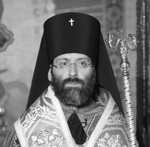 Archbishop Job of Telmessos (Ihor Getcha) was born in Montreal,Canada (1974) in a family a family of Ukrainian émigrés and educated at Collège Français (Montreal) and the University of Manitoba (Winnipeg). He studied theology at St. Andrew's College (Manitoba) and the St. Sergius Orthodox Theological Institute (Paris) from which he was awarded a doctorate, jointly with the Institut Catholique de Paris, in 2003, with a thesis on "The liturgical reform of Metropolitan Cyprian of Kiev". He was ordained priest by Archbishop Gabriel of Comane in 2003. On January 9, 2004, he was raised to hegumen, and on July 18 the same year, to archimandrite. He has worked as a lecturer and professor of church history, liturgy and canon law at various academic institutions including St Sergius, of which he was dean from 2005 to 2007, the Institut Catholique, theUniversity of Fribourgand, since 2009, the Orthodox Center of the Ecumenical Patriarchate in Chambesy,Switzerland. In November 2013 he was elected to lead the Patriarchal Exarchate for Orthodox Parishes of Russian Tradition in Western Europe; on 28 November 2015 the Holy Synod of the Ecumenical Patriarchate appointed him as the Patriarchate's representative to the World Council of Churches at Geneva. He has published Le Typikon décripté. Manuel de théologie byzantine (Paris, Cerf 2009), translated in English in 2012 (St Vladimir’s Seminary Press, New York) with the title: The Typikon Decoded.
Archbishop Job of Telmessos (Ihor Getcha) was born in Montreal,Canada (1974) in a family a family of Ukrainian émigrés and educated at Collège Français (Montreal) and the University of Manitoba (Winnipeg). He studied theology at St. Andrew's College (Manitoba) and the St. Sergius Orthodox Theological Institute (Paris) from which he was awarded a doctorate, jointly with the Institut Catholique de Paris, in 2003, with a thesis on "The liturgical reform of Metropolitan Cyprian of Kiev". He was ordained priest by Archbishop Gabriel of Comane in 2003. On January 9, 2004, he was raised to hegumen, and on July 18 the same year, to archimandrite. He has worked as a lecturer and professor of church history, liturgy and canon law at various academic institutions including St Sergius, of which he was dean from 2005 to 2007, the Institut Catholique, theUniversity of Fribourgand, since 2009, the Orthodox Center of the Ecumenical Patriarchate in Chambesy,Switzerland. In November 2013 he was elected to lead the Patriarchal Exarchate for Orthodox Parishes of Russian Tradition in Western Europe; on 28 November 2015 the Holy Synod of the Ecumenical Patriarchate appointed him as the Patriarchate's representative to the World Council of Churches at Geneva. He has published Le Typikon décripté. Manuel de théologie byzantine (Paris, Cerf 2009), translated in English in 2012 (St Vladimir’s Seminary Press, New York) with the title: The Typikon Decoded.
Panteleimon Manoussakis
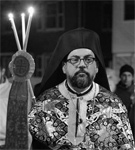 John Panteleimon Manoussakis was born in Athens, Greece, and educated in the United States (Ph.D.,Boston College). He was ordained into the diaconate in 1995 and into the priesthood in 2011, receiving the distinction of an archimandrite. He is a Honorary Fellow of the Faculty of Theology and Philosophy at the Australian Catholic University and he is the recipient of a Templeton Foundation grant. His research interests are in Philosophy of Religion, in Phenomenology (in particular Heidegger and Marion), in Ancient Greek Philosophy (especially Plato and the Neo-Platonic Tradition), in Patristics, and in Psychoanalysis. He is currently associate professor of Philosophy in the College of the Holy Cross (Worcester, Massachusetts), and the author of three books: God After Metaphysics: A Theological Aesthetic (Indiana University Press, 2007), Theos Philosophoumenos (Ellinika Grammata, 2004) and For the Unity of All: Contributions to the Theological Dialogue Between East and West (Eugene, OR: Cascade Books, 2015, to be published soon - september 2016 - in Italian by the Edizioni Qiqajon – Comunità di Bose). He also edited collective volumes and numerous articles in English, Greek, Russian, Serbian, and Ukrainian.
John Panteleimon Manoussakis was born in Athens, Greece, and educated in the United States (Ph.D.,Boston College). He was ordained into the diaconate in 1995 and into the priesthood in 2011, receiving the distinction of an archimandrite. He is a Honorary Fellow of the Faculty of Theology and Philosophy at the Australian Catholic University and he is the recipient of a Templeton Foundation grant. His research interests are in Philosophy of Religion, in Phenomenology (in particular Heidegger and Marion), in Ancient Greek Philosophy (especially Plato and the Neo-Platonic Tradition), in Patristics, and in Psychoanalysis. He is currently associate professor of Philosophy in the College of the Holy Cross (Worcester, Massachusetts), and the author of three books: God After Metaphysics: A Theological Aesthetic (Indiana University Press, 2007), Theos Philosophoumenos (Ellinika Grammata, 2004) and For the Unity of All: Contributions to the Theological Dialogue Between East and West (Eugene, OR: Cascade Books, 2015, to be published soon - september 2016 - in Italian by the Edizioni Qiqajon – Comunità di Bose). He also edited collective volumes and numerous articles in English, Greek, Russian, Serbian, and Ukrainian.
The Spirit as Source and Support of the One Christian Witness
"The Spirit as Source and Support of the One Christian Witness" explores the role of the Holy Spirit in bringing about and in sustaining the one witness to Gospel by all Christians. Emphasis will be placed on the understanding ofmartyriaasconfession/ ὁμολογία (with particular hermeneutical reading to such scriptural passages as Matthew 10:20 and 1 Corinthians 12:3).
Ekaterini Tsalampouni
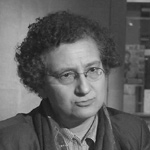 Ekaterini Tsalampouni is an Assistant Professor of the New Testament at theSchool of Social and Pastoral Theology at the Faculty of Theology of the Aristotle University of Thessaloniki. She received her PhD in New Testament from the Faculty of Theology of the AUTH in 1999, after which she worked as an assistant lecturer at the Institute of Orthodox Theology at Ludwig‐Maximillian University of Munich, Germany (2006‐2009) and as a lecturer at the School of Social and Pastoral Theology at the Faculty of Theology of the Aristotle University. She is a member of several societies, like the Society of Biblical Literature, the European Association of Biblical Studies, the European Society of Women in Theological Research, the Colloquium Oecumenicum Paulinum, and the Hellenic Bible Society. She has served as the treasurer of the European Association of Biblical Studies and the Vice Presidentof the European Society of Women in Theological Research. She is also a member of the Board of the Volos Academy of Theological Studies. Some of her publication sare Macedonia in New Testament Times (2000), Ecological Interpretation of the New Testament (2013), Exegetical Studies (2013) and she has also published several exegetical studies as well as studies on ecological hermeneutics and on the Graeco-Roman background of the New Testament.
Ekaterini Tsalampouni is an Assistant Professor of the New Testament at theSchool of Social and Pastoral Theology at the Faculty of Theology of the Aristotle University of Thessaloniki. She received her PhD in New Testament from the Faculty of Theology of the AUTH in 1999, after which she worked as an assistant lecturer at the Institute of Orthodox Theology at Ludwig‐Maximillian University of Munich, Germany (2006‐2009) and as a lecturer at the School of Social and Pastoral Theology at the Faculty of Theology of the Aristotle University. She is a member of several societies, like the Society of Biblical Literature, the European Association of Biblical Studies, the European Society of Women in Theological Research, the Colloquium Oecumenicum Paulinum, and the Hellenic Bible Society. She has served as the treasurer of the European Association of Biblical Studies and the Vice Presidentof the European Society of Women in Theological Research. She is also a member of the Board of the Volos Academy of Theological Studies. Some of her publication sare Macedonia in New Testament Times (2000), Ecological Interpretation of the New Testament (2013), Exegetical Studies (2013) and she has also published several exegetical studies as well as studies on ecological hermeneutics and on the Graeco-Roman background of the New Testament.
«Blessed are you when people persecute you on my account» (Mt 5,11).
Jesus’ Sayings about Persecution
In the first part of the paper, Jesus’ sayings about persecution and martyrdom, especially in the synoptic gospels, will be presented. The exegetical discussion will focus on tracing the early Christian tradition of martyrdom that is founded upon the dominical sayings and reflects the social situation in the early Christian communities that preserved it. Its theological implications, as well as its relation to the eschatological reality of the Kingdom of God, will be investigated in the second part of the paper. Consequently, the reception and adaptation of this tradition in the context of early Christian discourse on martyrdom will be briefly discussed. Finally, conclusions will be drawn regarding the theological significance of this tradition as well as its relevance to contemporary Christianity.
Georgij. E. Zakharov
Georgij. E. Zakharov(Moscow 1986) studied at the Orthodox University of St Tikhon and at the Institute of History of the Russian Academy of Sciences; his dissertation was on the “The Church in the social system of the Balkan-Danubian region in the fourth and fifth system”. Since 2007 he has been teaching history of the Church and patrology at the Orthodox University ofSt Tikhon. He is among the editors of the Russian edition of the complete works of St Ambrose of Milan and is studying the relations between the Roman See ad the Eastern Churches in the time of the Arian controversies, on which he has written two books.
“We are All One in Christ”. Martyrdom and the Unity of the Church in St Ambrose and the Latin Fathers in the Fourth Century
In the context of rapid changes in the relations between church and state after Constantine’s conversion and of the Arian crisis, which threatened catholic unity at all levels of church life, the theme of martyrdom acquires a special significance. The paper examines three types of “martyrdom narrative” in the Latin tradition, in authors such as Ambrose of Milan, Lucifer of Cagliari, Hilary of Poitiers, pope Liberius, and pope Damasus, Nicetas of Remesiana: 1) interpretation of martyrdom as a witness of faith; 2) imitation of martyrs as a form of spiritual ascesis; 3) martyrdom and the ideal of Rome’s renewal. At the end of the fourth century this narrative becomes part of a more universal and integral conception of the catholic Church as a communion in holy things and communion of saints (communion sanctorum). Such communion is not limited by social, ethnic, geographical, or temporal limits and manifests catholic unity always and everywhere.
Athanasios N. Papathanassiou
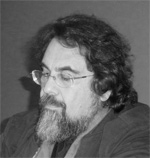 Athanasios N. Papathanassiou was born in Athens in 1959. He has a doctorate in theology and a degree in law. After a period of professional activity in law, he taught theology in secondary schools, primarily at the Zefyriou Lyceum in western Attica. In the years 2000–2008 he taught missiology, theology of the religions, and canon law at times at the Higher School of Theology in Athens and at the Higher Ecclesiastical Academy of Athens. Since the academic year 2008–20009 he has been teaching at the Hellenic Open University. He is chief editor of the prestigious theological review Synaxis and is a member of the European Society for Intercultural Theology and Interreligious Studies and of the editorial committee of the electronic review International Journal of Orthodox Theology. He has published studies on the encounter between Christianity and cultures, on the social activity of the Church, and on the dialogue of theology with the various currents of contemporary thought.
Athanasios N. Papathanassiou was born in Athens in 1959. He has a doctorate in theology and a degree in law. After a period of professional activity in law, he taught theology in secondary schools, primarily at the Zefyriou Lyceum in western Attica. In the years 2000–2008 he taught missiology, theology of the religions, and canon law at times at the Higher School of Theology in Athens and at the Higher Ecclesiastical Academy of Athens. Since the academic year 2008–20009 he has been teaching at the Hellenic Open University. He is chief editor of the prestigious theological review Synaxis and is a member of the European Society for Intercultural Theology and Interreligious Studies and of the editorial committee of the electronic review International Journal of Orthodox Theology. He has published studies on the encounter between Christianity and cultures, on the social activity of the Church, and on the dialogue of theology with the various currents of contemporary thought.
“I am the wheat of God” (St Ignatius of Antioch). Eucharistic and Communional Dimensions of Martyrdom
The Eucharist is an act of the Christian community: a meal at which the members of the community participate and from which are excluded those who do not belong to it. Nevertheless, in St Ignatius of Antioch we find a vision that opens the Eucharist. Martyrdom (an event that takes place in public space) transforms the Christian into Eucharistic bread, which is offered in the course of a “liturgy” celebrated in the open space of society. In addition, one form of martyrdom is also to suffer with history’s victims. Solidarity in founded on Christ’s incarnation and extend the confines of the community, making an ethical criterion (responsibility towards the other) as its basic characteristic.
+ Jeronim of Jegar
 Bishop Jeronim (Močević) of Jegar was born in Sarajevo on 26 September 1969.
Bishop Jeronim (Močević) of Jegar was born in Sarajevo on 26 September 1969.
He was tonsured in the monastery of Holy Archangels in Kovilj on 21st November 1990, ordained deacon on 27 January 1991, promoted as archdeacon on 26 July 1999. Archdeacon Jerome graduated at the Orthodox Theological Faculty in Belgrade in 2002, and the next year he was ordained as hieromonk.
As post-graduate student he spent several years at the Pontifical Oriental Institute in Rome, where he acquired the title of a Master of theology having made research into liturgical sciences. Metropolitan Jakovos of Mitilina promoted him into the rank of archimandrite in the church of St. Philothea in Smirna (Asia Minor), Turkey, in 2008.
It was in the monastery of Prophet Elias in the island Lesbos in Greece that Metropolitan Theolyptos promoted Fr. Jerome as spiritual father. At the time being he has been writing his doctoral thesis in the field of liturgical theology. He speaks Greek, Italian, French, Russian, German and English. At the regular session of the Holy Council of Bishops of the Serbian Orthodox Church on May 14, 2014 he was elected as Vicar Bishop of the Bishop of Backa Ireneus with the title Bishop of Jegar.
Fr Jerome will be consecrated as Bishop in the Cathedral church of St. George of Novi Sad on September 28, 2014. The sacrament of consecration will officiate His Holiness Serbian Patriarch Ireneus with several Hierarchs.
Andrew Louth
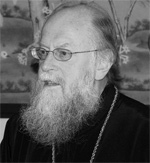 Andrew Louth isa priest of the Russian Orthodox Patriarchal Diocese of Sourozh since 2003 and serves a parish in Durham. His collegiate education was at the Universities of Cambridge and Edinburgh where he studied Mathematics and Theology and prepared his thesis which concerned Karl Barth. After graduation he taught early Christian theology and patristics in the University of Oxford and early Medieval and Byzantine history Goldsmiths College in the University of London. Fr. Louth has been Professor of Patristic and Byzantine Studies at Durham University since 1996. He teaches courses on the history and theology of the Christian Church: an undergraduate module dealing with the impact of the rise of Islam on mostly Greek Christianity in the eastern Mediterranean and a Master of Arts module on the understanding of what it is to be human in early Christian theology. His interests in research lie mostly in the history of theology in the Greek tradition, especially in Byzantine period. He is also interested in later periods including the modern period; that is the nineteenth century and later, where his research includes Russian and Romanian Orthodox theology. His interest in the theology of these periods is not purely historical, since he regards dialogue with the theological writers of the past as a resource for theological reflection today. His also concerned with the Christian Mystical Tradition. His books include: Origins of the Christian Mystical Tradition: from Plato to Denys, Discerning the mystery: an essay on the nature of theology, books on Dionysios (or Denys) the Areopagite, Maximos the Confessor, and John Damascene, and on the tradition of desert spirituality in the Christian tradition, both east and west (The Wilderness of God), Greek East and Latin West: the Church AD 681-1071; Modern Orthodox Thinkers. From Phikokalia to the present (2015). His also editor of the journal Sobornost, and editor, with Professor Gillian Clark of Bristol University, of the series Oxford Early Christian Studies.
Andrew Louth isa priest of the Russian Orthodox Patriarchal Diocese of Sourozh since 2003 and serves a parish in Durham. His collegiate education was at the Universities of Cambridge and Edinburgh where he studied Mathematics and Theology and prepared his thesis which concerned Karl Barth. After graduation he taught early Christian theology and patristics in the University of Oxford and early Medieval and Byzantine history Goldsmiths College in the University of London. Fr. Louth has been Professor of Patristic and Byzantine Studies at Durham University since 1996. He teaches courses on the history and theology of the Christian Church: an undergraduate module dealing with the impact of the rise of Islam on mostly Greek Christianity in the eastern Mediterranean and a Master of Arts module on the understanding of what it is to be human in early Christian theology. His interests in research lie mostly in the history of theology in the Greek tradition, especially in Byzantine period. He is also interested in later periods including the modern period; that is the nineteenth century and later, where his research includes Russian and Romanian Orthodox theology. His interest in the theology of these periods is not purely historical, since he regards dialogue with the theological writers of the past as a resource for theological reflection today. His also concerned with the Christian Mystical Tradition. His books include: Origins of the Christian Mystical Tradition: from Plato to Denys, Discerning the mystery: an essay on the nature of theology, books on Dionysios (or Denys) the Areopagite, Maximos the Confessor, and John Damascene, and on the tradition of desert spirituality in the Christian tradition, both east and west (The Wilderness of God), Greek East and Latin West: the Church AD 681-1071; Modern Orthodox Thinkers. From Phikokalia to the present (2015). His also editor of the journal Sobornost, and editor, with Professor Gillian Clark of Bristol University, of the series Oxford Early Christian Studies.
Seeking Communion, Confessing the Truth. Maxim the Confessor and Pope Martin I
The paper looks at the case of the Greek monk Maximus the Confessor and Pope Martin V, both of whom remained faithful to the ecumenical councils and courageously confessed the faith in the middle of the seventh century. This put them in opposition to monoenergism and monothelism, doctrines promoted by the emperors, who, under the pressure of the Muslim invasions of the Eastern provinces, tried to unify Christian divisions provoked by the Council of Chalcedon (451). This case proposes for consideration the question: how can there be a conflict between the requirements of communion an those of truth? Actually, the case of the two saints shows how the search for communion and the witness of faith appear in conflict if the search for communion serves interests other than those of the Church’s faith. In such a case, martyrdom and the confession of faith, as of these two saints, is the only means of guarding and keeping the authentic communion in truth with the universal Church.
Kirill Kaleda
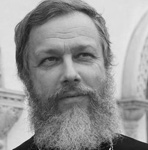 Kirill Kaleda, born 1958, is rector of the church of Russian New Martyrs and Confessors at the Butovo polygon, the principal place of mass executions and burials of the victims in the Moscow region. Father Kirill devotes himself to the study of the new martyrs of the Russian Orthodox Church and to assuring that the victims of the atheist soviet regime are not forgotten.
Kirill Kaleda, born 1958, is rector of the church of Russian New Martyrs and Confessors at the Butovo polygon, the principal place of mass executions and burials of the victims in the Moscow region. Father Kirill devotes himself to the study of the new martyrs of the Russian Orthodox Church and to assuring that the victims of the atheist soviet regime are not forgotten.
Martyrs of the Russian Orthodox Church in the Twentieth Century. The Butovo Polygon
The paper makes a parallel between the persecutions of the Church in the age of the ancient martyrs and in the twentieth century in Russia. Particular attention will be given to the years of the “great terror”, 1937–1938, the firing polygon in Butovo, the background and number of the victims on account of their faith in Christ, the discovery of the polygon in the 1990s, the building of the church and civil monument.
+ John Stroyan of Warwick
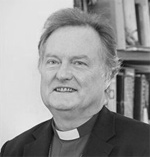
Bishop John was first drawn to the riches of Orthodoxy when studying at the Ecumenical Institute, Bossey , in 1982, where, through the lens of Rubliev’s Icon of Hospitality, the Holy Trinity, he studied the notion of perichoresis in the Orthodox tradition, under the tutorship of one who is now the Patriarch of Romania, Daniel. Since then, he has written papers on Hesychia in the Orthodox tradition and on the Theology of Iconography. He has been a friend and regular visitor of the Holy Monastery of St John the Baptist in Essex over the last 25 years and has been greatly enriched by the lives and writings of St Silouan of Athos and his disciple, Fr Sophrony, the founder of the Monastery. He has visited several monasteries, Vatopedi, Karakalou and St Paul’s, and a skete, Prodromou, on the Holy Mountain. His studies of the Jesus Prayer have led him also to the Holy Monasteries of Moldavia, and the work of Paisius Velichkovski in popularising the Jesus Prayer in the 18th century.
Since 2006 he has been a member of the International Theological Commission for Anglican- Orthodox Theological Dialogue. For this he has contributed papers on Repentance and Holiness and on Sacrifice, Salvation and Community towards the publication of the Commission’s recent report In the Image and Likeness of God: A Hope-Filled Anthropology. As part of the Commission, he has been much enriched by his experience of the Orthodox Church in Crete, in Albania and Serbia. He has also spent time in Russia, visiting the Patriarchate and monasteries in Russia.
He has visited regularly the Holy Lands building relationships with Eastern and Orthodox Churches there. In 2007, he visited Syria, on behalf of the Archbishop of Canterbury, spending time in Damascus, in Aleppo and in Hasakeh, meeting with Christian – and other faith – leaders there.
Lidya Golovkova
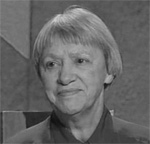 Lidya Golovkova, a graphic artist by training, from 1994 teaches at the Department of contemporary history of the Russian Orthodox Church of the Orthodox St Tikhon University. Her field of studies includes the martyrs and confessors of the twentieth century, repression, the history of prisons and concentration camps in the USSR. She has conducted research on the papers of those condemned for religious motives and on the places of mass execution. She has collaborated in publications on the trial of Patriarch Tikhon and on an encyclopedic dictionary of new martyrs and confessors in Kazakhstan.
Lidya Golovkova, a graphic artist by training, from 1994 teaches at the Department of contemporary history of the Russian Orthodox Church of the Orthodox St Tikhon University. Her field of studies includes the martyrs and confessors of the twentieth century, repression, the history of prisons and concentration camps in the USSR. She has conducted research on the papers of those condemned for religious motives and on the places of mass execution. She has collaborated in publications on the trial of Patriarch Tikhon and on an encyclopedic dictionary of new martyrs and confessors in Kazakhstan.
The Testimony of Love and Mercy of St Elizabeth Feodorovna
The human and spiritual figure of great duchess Elizabeth Fedorovna, wife of great duke Sergej Aleksandrovič. After the assassination of her husband Elizabeth founded the monastic community of Martha and Maria, in which the nuns united the striving of a spiritual life with service to the needy. After the revolution Elizabeth was arrested and killed together with the nun Barbara on 18 July 1918. In 1992 the two were canonized by the Russian Orthodox Church among the neo-martyrs and confessors. In particular, her last days will be examined on the basis of archival documents and findings at the place of martyrdom.
Konstantiv Sigov
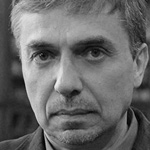 Konstantin Sigov (Kiev 1962) teaches history of theological and philosophical ideas at the Mohyla Academy State University in Kiev and directs the Center of European Humanities Research. In 1992 he founded the cultural and publishing association (Spirit and Letter (Dukh i Litera), of which he is the director. Its publishing projects have been the basis for a network of contacts with the most important European schools of thought and which brought to Kiev scholars and philosophers uh as Paul Ricœur, Reinhard Kozellek, Arvo Pärt, Georges Nivat, and others. Konstantin Sigov has published translations of the works of Patriarch Bartholomeos I, cardinal Walter Kasper, archbishop Rowan Williams, Enzo Bianchi, Michel van Parys, and of fundamental documents of the ecumenical dialogue between Catholics and Orthodox. Since 2000 he has organized every year the international ecumenical forum Dormition Readings (Uspenskie Čtenija) and publishes its Acts. He is the author of over fifty studies in philosophy, theology, and history of culture, published also in Italy, France, Germany, United States, England, and Sweden. He has held lectures at the Sorbonne, at the Universities of Oxford, Stanford, Rome, geneva, Louvain, and others. The French Ministry of Education has named him Chevalier dans l’Ordre des Palmes Academiques.
Konstantin Sigov (Kiev 1962) teaches history of theological and philosophical ideas at the Mohyla Academy State University in Kiev and directs the Center of European Humanities Research. In 1992 he founded the cultural and publishing association (Spirit and Letter (Dukh i Litera), of which he is the director. Its publishing projects have been the basis for a network of contacts with the most important European schools of thought and which brought to Kiev scholars and philosophers uh as Paul Ricœur, Reinhard Kozellek, Arvo Pärt, Georges Nivat, and others. Konstantin Sigov has published translations of the works of Patriarch Bartholomeos I, cardinal Walter Kasper, archbishop Rowan Williams, Enzo Bianchi, Michel van Parys, and of fundamental documents of the ecumenical dialogue between Catholics and Orthodox. Since 2000 he has organized every year the international ecumenical forum Dormition Readings (Uspenskie Čtenija) and publishes its Acts. He is the author of over fifty studies in philosophy, theology, and history of culture, published also in Italy, France, Germany, United States, England, and Sweden. He has held lectures at the Sorbonne, at the Universities of Oxford, Stanford, Rome, geneva, Louvain, and others. The French Ministry of Education has named him Chevalier dans l’Ordre des Palmes Academiques.
A Community under Persecution. Father Alexander Glagolev (1872-1937)
The life of witnesses and the way of martyrs are the criteria for a new critical look at the martyrology of the twentieth century. The self-awareness of an entire host of anonymous witnesses to truth is expressed lucidly in the words of the last rector of the Theological Academy of Kiev, the priest Aleksandr Glagolev, that he pronounced during his interrogations in 1937: “Only then will the sufferings of Christians resemble Christ’s sufferings and will be salvific for those who suffer when these in their sufferings will be able to preserve the true faith and a firm love of the heavenly Father… and will be able to maintain fraternal love for their neighbors, not excluding their enemies”.
Through a reconstruction of the life of the new martyr Aleksandr Glagolev and of his son, the holy righteous father Aleksej Glagolev (†1972), and of the community gathered around them, the paper attempts to discover how the martyrs themselves saw their path as a way of love and communion. “The most important thing in martyrdom is not blood, but unchanged and unchanging love” (metropolitan Anthony Bloom). Without love, there is no witness to the truth. The criterion of truth is the “law of love”.
Tamara Grdzelidze
 Tamara Grdzelidze is a graduate of Tbilisi University in Georgia, St Vladimir’s Theological Seminary in the United States, and Oxford University in the United Kingdom. In Georgia she did research in Georgian Hagiography at Shota Rustaveli Institute of Georgian Literature, as well as taught Georgian language and literature at school. From January 2001 through December 2013, Grdzelidze served in Geneva, Switzerland, as a programme executive for the WCC Commission on Faith and Order, which coordinates dialogue among Christian leaders on matters related to theology, doctrine and the nature of the church. She describes her experience of inter-church and inter-cultural dialogue while at the WCC as “a school of international relations” in itself. In 2014 she was appointed by the Ministry of Foreign Affairs of Georgia Ambassador of Georgia in the Holy See (Vatican). Among the gifts she presented to Pope Francis was a copy of the bookA Cloud of Witnesses: Opportunities for Ecumenical Commemoration, a WCC publication which she co-edited in 2009 with Br. Guido Dotti, member of the Monastic Community of Bose. She published widely on Georgian hagiography, Georgian church history, orthodoxy and modern issues, ecclesiology, hermeneutics, inter-confessional dialogue. Among her publications: The limits of the Church: Essays from Orthodox Theologians on Ecumenism, ed. Tamara Grdzelidze, Tbilisi 2000; Georgian Monks on Mount Athos: Two Eleventh Century Lives on the Hegoumenoi of Iviron (2009); Reading the Gospels with the Early Church: A Guide, ed. Tamara Grdzelidze Geneva 2013.
Tamara Grdzelidze is a graduate of Tbilisi University in Georgia, St Vladimir’s Theological Seminary in the United States, and Oxford University in the United Kingdom. In Georgia she did research in Georgian Hagiography at Shota Rustaveli Institute of Georgian Literature, as well as taught Georgian language and literature at school. From January 2001 through December 2013, Grdzelidze served in Geneva, Switzerland, as a programme executive for the WCC Commission on Faith and Order, which coordinates dialogue among Christian leaders on matters related to theology, doctrine and the nature of the church. She describes her experience of inter-church and inter-cultural dialogue while at the WCC as “a school of international relations” in itself. In 2014 she was appointed by the Ministry of Foreign Affairs of Georgia Ambassador of Georgia in the Holy See (Vatican). Among the gifts she presented to Pope Francis was a copy of the bookA Cloud of Witnesses: Opportunities for Ecumenical Commemoration, a WCC publication which she co-edited in 2009 with Br. Guido Dotti, member of the Monastic Community of Bose. She published widely on Georgian hagiography, Georgian church history, orthodoxy and modern issues, ecclesiology, hermeneutics, inter-confessional dialogue. Among her publications: The limits of the Church: Essays from Orthodox Theologians on Ecumenism, ed. Tamara Grdzelidze, Tbilisi 2000; Georgian Monks on Mount Athos: Two Eleventh Century Lives on the Hegoumenoi of Iviron (2009); Reading the Gospels with the Early Church: A Guide, ed. Tamara Grdzelidze Geneva 2013.
Martyrology in the Twentieth Century: Orthodox Church of Georgia
The paper reconstructs the story of the Georgian martyrs (mainly clerics, but also laypeople) who gave witness in defense of justice and of the rights of Church in the first years of the Soviet regime in Georgia (established in 1921). Their recent canonization and acknowledgment as martyrs by the Orthodox Church of Georgia (though they do not correspond to the category of “classical martyrdom” in odium fidei) constitutes an significant event. The speaker is convinced that the act of remembering can be a source of reconciliation and that history changes only by establishing new relations with the past, by willingness to remember not for the sake of remembering but for the sake of making peace. The new Georgian martyrs witnessed to Christ up to the death, they stood up as rivals to the existing political system causing injustice. In the act of their canonisation by the Orthodox Church of Georgia we can see a good balance between the national interests and struggle against injustice and violation of the human dignity, a way of restoring the “brokenness” of the Body of Christ.
Bogdan Tataru-Cazaban
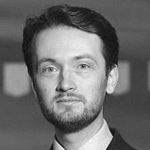 Bogdan Tataru-Cazaban is ambassador of Romania to the Holy See since 2010. He obtained a doctorate from the University of Bucharest in patristic and medieval philosophy and is a founding member of the Institute for the history of religions at the Romanian Academy. He has been a visiting professor at the Faculty of Orthodox Theology in Bucharest. His other scientific and editorial work has been in the fields of history of Christianity, Thomistic studies, French phenomenology, among others. He is the author of several books on philosophy and theology and has also translated into Romanian Saint Augustine, Boethius, Hugo of Saint Victor, Nicholas of Cusa, R. Klibansky, E. Panofsky, and E. Lévinas.
Bogdan Tataru-Cazaban is ambassador of Romania to the Holy See since 2010. He obtained a doctorate from the University of Bucharest in patristic and medieval philosophy and is a founding member of the Institute for the history of religions at the Romanian Academy. He has been a visiting professor at the Faculty of Orthodox Theology in Bucharest. His other scientific and editorial work has been in the fields of history of Christianity, Thomistic studies, French phenomenology, among others. He is the author of several books on philosophy and theology and has also translated into Romanian Saint Augustine, Boethius, Hugo of Saint Victor, Nicholas of Cusa, R. Klibansky, E. Panofsky, and E. Lévinas.
Persecution for Christ’s Sake as the bond of Communion. The Monk Nicolae Steinhardt and his Diary of Happiness
Steinhardt incarnated nobility of spirit in a world that seemed downtrodden forever and confidence in humanity in a world disfigured by hatred and resentment. He was a knight of the absolute in a society undermined by betrayals and duplicity. As a reader of Proust, Tocqueville, Chesterton, S. Weil, Valery, Bernanos, he introduced into the way the Orthodox faith, with its immutable rhythms, is lived a provocative freshness, a new style, a profoundly modern authenticity. He was converted in a communist prison and later became a monk in northern Transylvania. With Stăniloae, the great neo-patristic theologian, and Scrima, the theologian of ecumenical dialogue, Steinhart illustrates one of the facets of Romanian Orthodoxy in the twentieth century. It is no accident that John Paul II cited him during his visit to Bucharest: (Among the numerous witnesses to Christ I wish to mention the monk of Rohia, Nicu Steinhart, an extraordinary figure of a believer and a man of culture who perceived in a special way the immense common riches of the Christian Churches”.
Daniela Kalkandjieva
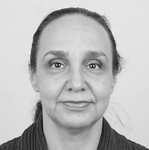 Daniela Kalkandjieva, after having studied history at the Sy Kliment Ohridski University in Sofia, received her doctorate from the Central European University in Hungary; her thesis was on the ecclesiastical and political aspects of the activity of the Moscow Patriarchate. In addition, she has done research on the Bulgarian Church, especially on the relations between religion and the public sphere, on inter-confessional dialogue, on the impact that the process of integration into Europe has on the Orthodox Church. Among her publication we may mention The Russian Orthodox Church 1917–1948, From Decline to Resurrection (London 2015) and a study on the Bulgarian Church in the years 1944–1953 (Sofia 1997).
Daniela Kalkandjieva, after having studied history at the Sy Kliment Ohridski University in Sofia, received her doctorate from the Central European University in Hungary; her thesis was on the ecclesiastical and political aspects of the activity of the Moscow Patriarchate. In addition, she has done research on the Bulgarian Church, especially on the relations between religion and the public sphere, on inter-confessional dialogue, on the impact that the process of integration into Europe has on the Orthodox Church. Among her publication we may mention The Russian Orthodox Church 1917–1948, From Decline to Resurrection (London 2015) and a study on the Bulgarian Church in the years 1944–1953 (Sofia 1997).
Martyrs and Confessors in the Bulgarian Orthodox Church under Communism
In 1989, the fall of communism in Bulgaria broke the silence on the victimhood of Orthodox clerics during the rule of militant atheists. 27 year later, however, their canonization is still an open issue. None of them has been canonically recognized as a martyr or confessor. No date in the church calendar is dedicated for the commemoration of the servants of God who had not betrayed their vocation and who had witnessed their faith through martyrdom. Meanwhile, the archives of the Bulgarian Communist Party and its security services were declassified. Their study shed new light on the destinies of hundreds Orthodox black and white clerics who remained firm in their faith despite the severe persecutions and inhuman tortures. In this regard, the paper will discuss cases of hierarchs, priests, and monks of the Bulgarian Orthodox Church, whose personal stories give us grounds to refer to them as martyrs and confessors.
At the same time, the paper raises the question: If “the blood of martyrs is the seed of Church” (Tertullian), why does the Bulgarian Orthodox Church prolong the canonization of those whose deaths in Christ can assist the revitalization of Christianity in such a post-atheist society as the Bulgarian? There is no simple answer to this question. Victimhood was not a guarantee for sainthood neither in the first centuries of Christianity, nor under communism. In the Bulgarian case, however, this relationship has been additionally complicated by the specific anti-religious policy adopted by the communists upon their seizure of power on 9 September 1944. More specifically, they did not follow the Bolshevik model of an open assault on religion. Instead, a more sophisticated strategy was adopted. It did not pursue an immediate destruction of the national Orthodox Church, but her transformation into pseudo-religious institution. In addition, the new communist rulers skillfully used the wartime situation to get rid of the most zealous and influential clerics under the slogan of fighting fascism. This and other specificities of the persecution of the Orthodox white and black clergy in Bulgaria do not allow us closely to follow the Russian experience in the canonization of Orthodox churchmen killed by the Bolsheviks in the 1920s and 1930s. The mentioned peculiarity does not mean an absence of Bulgarian Orthodox martyrs and confessors, but calls for a different approach, which to overcome the communist discourse that continues to distort the truth about the martyrdom of Orthodox clerics, by presenting them as “fascists”, “people’s enemies” or simply as criminals.
Shahe Ananyan
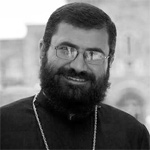 Shahe Ananyan was born on October 1, 1982 in Nor Achin (Kotayk region, Republic of Armenia). He received his primary education at the local secondary school and graduated in 1999. 1999-2003 he studied at the Vaskenyan Theological Academy. 2003-2005 studied at the Gevorkyan Theological Seminary, Mother See of Holy Etchmiadzin. In 2005 he defended his M.A. thesis: ‘’indirect sentences in four Gospels: Old Armenian version and Greek text”. On December 26, 2004 he was ordained as deacon by the Primate of the Armenian diocese in Russia and Nor Nakhidjevan, His Grace Bishop Yezras Nersissian. On September 25, 2005 he was ordained as a celibate priest (abekha) by His Grace Bishop Daron Jerejian. From July 2005 he served at the Pontifical Residence as personal Secretary and Staff Bearer of His Holiness KAREKIN II, Supreme Patriarch and Catholicos of All Armenians. In 2006-2010 he studied at Catholic University of Paris and ELCOA (Ecole des langues et des civilizations de l’Orient Ancient-Graduate School of the Languages and Civilizations of Ancient Orient), Sorbonne, Paris. In 2010 he successfully defended his thesis: “Book of Proverbs (Chapter 8): An essay of canonical-theological lecture in the Armenian Tradition”, receiving a degree of licence canonique (PhD in Catholic Theology). In 2009 he was appointed as the deputy director and editor in chief of the “Etchmiadzin” monthly. Since 2011 he is the director of newly established “Official press” department of Holy See. In 2012 he defended his thesis for the rank of Archimandrite (Vardapet), entitled “Wisdom and Bible. Interpretation and theology of the Book of Proverbs (chapters 1-9)”, receiving the rank of Archimandrite. In 2013 Fr. Shahe, with the blessing of His Holiness, was appointed as head and director of the Publishing Department of Holy See, and in 2015, as director of Inter-Church Relationships department. Since 2009 he lectures at Gevorkyan Theological Seminary as a lecturer of Old Testament Theology, and from 2012 at Yerevan State Linguistic University after V. Bryusov as a professor of Religious Studies and member of faculty. From 2013-2016 he studied at the Yerevan State University (Faculty of Philosophy and Psychology) as a PhD student in the chair of History and Theory of Philosophy, defending his PhD thesis: “Judaeo-hellenistic hermeneutics’ influence on the formation and development of early Christian religious philosophy ”. In 2016 he defended his thesis for the rank of Supreme Archimandrite (Tsayragouyn Vardapet): “The theoretical basics of the early Christian exegetical literature (I-III cc.): Historical-theological analysis of main sources”. In the same year, with the blessing of His Holiness Karekin II, His Grace Bishop Vahan Hovhannesyan, Primate of the Armenian Diocese of France, bestowed the rank of Supreme Archimandrite upon Shahe vardapet Ananyan.
Shahe Ananyan was born on October 1, 1982 in Nor Achin (Kotayk region, Republic of Armenia). He received his primary education at the local secondary school and graduated in 1999. 1999-2003 he studied at the Vaskenyan Theological Academy. 2003-2005 studied at the Gevorkyan Theological Seminary, Mother See of Holy Etchmiadzin. In 2005 he defended his M.A. thesis: ‘’indirect sentences in four Gospels: Old Armenian version and Greek text”. On December 26, 2004 he was ordained as deacon by the Primate of the Armenian diocese in Russia and Nor Nakhidjevan, His Grace Bishop Yezras Nersissian. On September 25, 2005 he was ordained as a celibate priest (abekha) by His Grace Bishop Daron Jerejian. From July 2005 he served at the Pontifical Residence as personal Secretary and Staff Bearer of His Holiness KAREKIN II, Supreme Patriarch and Catholicos of All Armenians. In 2006-2010 he studied at Catholic University of Paris and ELCOA (Ecole des langues et des civilizations de l’Orient Ancient-Graduate School of the Languages and Civilizations of Ancient Orient), Sorbonne, Paris. In 2010 he successfully defended his thesis: “Book of Proverbs (Chapter 8): An essay of canonical-theological lecture in the Armenian Tradition”, receiving a degree of licence canonique (PhD in Catholic Theology). In 2009 he was appointed as the deputy director and editor in chief of the “Etchmiadzin” monthly. Since 2011 he is the director of newly established “Official press” department of Holy See. In 2012 he defended his thesis for the rank of Archimandrite (Vardapet), entitled “Wisdom and Bible. Interpretation and theology of the Book of Proverbs (chapters 1-9)”, receiving the rank of Archimandrite. In 2013 Fr. Shahe, with the blessing of His Holiness, was appointed as head and director of the Publishing Department of Holy See, and in 2015, as director of Inter-Church Relationships department. Since 2009 he lectures at Gevorkyan Theological Seminary as a lecturer of Old Testament Theology, and from 2012 at Yerevan State Linguistic University after V. Bryusov as a professor of Religious Studies and member of faculty. From 2013-2016 he studied at the Yerevan State University (Faculty of Philosophy and Psychology) as a PhD student in the chair of History and Theory of Philosophy, defending his PhD thesis: “Judaeo-hellenistic hermeneutics’ influence on the formation and development of early Christian religious philosophy ”. In 2016 he defended his thesis for the rank of Supreme Archimandrite (Tsayragouyn Vardapet): “The theoretical basics of the early Christian exegetical literature (I-III cc.): Historical-theological analysis of main sources”. In the same year, with the blessing of His Holiness Karekin II, His Grace Bishop Vahan Hovhannesyan, Primate of the Armenian Diocese of France, bestowed the rank of Supreme Archimandrite upon Shahe vardapet Ananyan.
Martyrs as Witnesses of Communion in the Armenian Church: Holy Martyrs of Genocide and Soviet Regime in the twentieth century Armenia
The paper presents two emblematic figures of the Armenian Apostolic Church ot the XXth century: the Vardapet Komitas Soghomonyan (1869-1935), founder of the Armenian national music school and “living martyr” of the Great Armenian Genocide (1915-1923), and the Catholicos Khoren I Muradbekian (1932-1938) chief of the Armenian Church murdered by the hands of secret police agents of the Soviet regime. Both figures became collective symbols and images of the sufferings of the entire Armenian people, representing and realizing communion by their own lives (the first also by his important musical work) between generations and within the Christian conscience of the Armenians. The author is convinced that the recent proclamation of the sainthood of the Armenian new martyrs has changed and maintains to change the concept of martyrdom and Christian witness within Christian Armenian conscience. This change requires acknowledging officially the martyrdom of many other forgotten martyrs which came after and even before the Armenian Genocide (for example during the Soviet period). In this respect martyrs continue to be witness of communion, as a spiritual link which allows the Church to reappropriate her own heritage.
Aristotle Papanikolaou
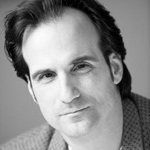 Aristotle Papanikolaou was born/raised in Chicago, Il. He is a co-founder and Senior Fellow at Fordham’s Orthodox Christian Studies Center and the Center for the Study of Law and Religion at Emory University. In 2012, he received the Award for Excellence in Undergraduate Teaching in the Humanities. He enjoys Russian Literature and Byzantine Music. His areas of expertise are Eastern Orthodox theology, trinitarian theology, and religion in public life. He is currently developing an expertise on the relation between theological anthropology, violence and virtue ethics. His on-going research interests include contemporary Orthodox theology (nineteenth and twentieth centuries) and trinitarian theology. His current research agenda relates to theological anthropology, and specifically explores the relevancy of truth-telling (confession) for understanding what it means to be human. The project is interdisciplinary and focuses on the affective effect of truth-telling; that is, the impact of truth-telling on the landscape of human emotions and desires, and how such an impact is conditioned by the presence or absence of a particular listener. He was awarded a Sabbatical Grant for Researchers from the Louisville Institute for his project The Ascetics of War, which explores the relevancy of the Eastern Orthodox notion of virtue and the role of truth-telling for undoing the affective effects of war on the human person. As a theological anthropology, he is interested in the question of how truth-telling can illuminate understandings of identity, sin, virtue, the communication of grace, a relational understanding of personhood, and the Orthodox notion of theosis. Among his publications: The Mystical as Political: Democracy and Non-Radical Orthodoxy, Notre Dame, Indiana 2012; Being with God: Trinity, Apophaticism, and Divine-Human Communion, Notre Dame, Indiana 2006; “The Ascetics of War: The Undoing and Redoing of Virtue,” in Orthodox Perspectives on War, ed. Perry Hamalis, Notre Dame Press, forthcoming; “Modes of Godly Being: Reflections on the Virtues in Eastern Orthodox Christianity”, eds. Aristotle Papanikolaou and Perry Hamalis, in Studies in Christian Ethics 26:3 (August 2013); Orthodox Constructions of the West, eds. George Demacopoulos and Aristotle Papanikolaou (New York: Fordham University Press, 2013); Orthodox Readings of Augustine, eds. George Demacopoulos and Aristotle Papanikolaou (St. Vladimir’s Seminary Press, 2008); Thinking through Faith: New Perspectives from Orthodox Christian Scholars, eds. Aristotle Papanikolaou and Elizabeth Prodromou (St. Vladimir’s Seminary Press, 2008);“Learning How to Love: St. Maximus on Virtue”, in Knowing the Purpose of Creation Through the Resurrection: Proceedings of the Symposium on St. Maximus the Confessor, ed. Bishop Maxim Vasiljević (Alhambra, CA: Sebastian Press & The Faculty of Orthodox Theology – University of Belgrade, 2013): 239-250.
Aristotle Papanikolaou was born/raised in Chicago, Il. He is a co-founder and Senior Fellow at Fordham’s Orthodox Christian Studies Center and the Center for the Study of Law and Religion at Emory University. In 2012, he received the Award for Excellence in Undergraduate Teaching in the Humanities. He enjoys Russian Literature and Byzantine Music. His areas of expertise are Eastern Orthodox theology, trinitarian theology, and religion in public life. He is currently developing an expertise on the relation between theological anthropology, violence and virtue ethics. His on-going research interests include contemporary Orthodox theology (nineteenth and twentieth centuries) and trinitarian theology. His current research agenda relates to theological anthropology, and specifically explores the relevancy of truth-telling (confession) for understanding what it means to be human. The project is interdisciplinary and focuses on the affective effect of truth-telling; that is, the impact of truth-telling on the landscape of human emotions and desires, and how such an impact is conditioned by the presence or absence of a particular listener. He was awarded a Sabbatical Grant for Researchers from the Louisville Institute for his project The Ascetics of War, which explores the relevancy of the Eastern Orthodox notion of virtue and the role of truth-telling for undoing the affective effects of war on the human person. As a theological anthropology, he is interested in the question of how truth-telling can illuminate understandings of identity, sin, virtue, the communication of grace, a relational understanding of personhood, and the Orthodox notion of theosis. Among his publications: The Mystical as Political: Democracy and Non-Radical Orthodoxy, Notre Dame, Indiana 2012; Being with God: Trinity, Apophaticism, and Divine-Human Communion, Notre Dame, Indiana 2006; “The Ascetics of War: The Undoing and Redoing of Virtue,” in Orthodox Perspectives on War, ed. Perry Hamalis, Notre Dame Press, forthcoming; “Modes of Godly Being: Reflections on the Virtues in Eastern Orthodox Christianity”, eds. Aristotle Papanikolaou and Perry Hamalis, in Studies in Christian Ethics 26:3 (August 2013); Orthodox Constructions of the West, eds. George Demacopoulos and Aristotle Papanikolaou (New York: Fordham University Press, 2013); Orthodox Readings of Augustine, eds. George Demacopoulos and Aristotle Papanikolaou (St. Vladimir’s Seminary Press, 2008); Thinking through Faith: New Perspectives from Orthodox Christian Scholars, eds. Aristotle Papanikolaou and Elizabeth Prodromou (St. Vladimir’s Seminary Press, 2008);“Learning How to Love: St. Maximus on Virtue”, in Knowing the Purpose of Creation Through the Resurrection: Proceedings of the Symposium on St. Maximus the Confessor, ed. Bishop Maxim Vasiljević (Alhambra, CA: Sebastian Press & The Faculty of Orthodox Theology – University of Belgrade, 2013): 239-250.
Truth-Telling as Martydom for the Sake of Communion
What are the constitutive elements of martyrdom such that it is distinguishable from suicide or other forms of voluntary death? Martyrdom is an event of communion constituted by a particular kind of interrelation between death, the other, and truth-telling. What constitutes death-as-martyrdom is not death per se out of belief in the promised resurrection, but a death that results from a telling of the truth and which enables communion. The author illustrates what he calls “phenomenology of martyrdom” through the phenomenology of truth-telling. The act of truth-telling which is received by someone else in truth and love becomes an event of freedom; it is a form of martyrdom and enables communion, by removing the mask that prevents communion with the other. The author raises the question whether martyrdom-as-truth-telling for the sake of communion has political implications. He is convinced that in societies of liberal democracies, despite great differences and apparent incompatibilities with the form of communion which is lived within Church, the capacity for truth-telling enables a real “politics of martyrdom”, and its sign is discernable in the visible manifestations of political communion, of forms of relationality across deep and abiding differences that constitute human beings a unique. In the concluding remarks the author suggests that the martyrs' gift to humanity is the witness that there can be no communion without martyrdom, without a death--spiritual or physical--that results from truth-telling to an other. It is only in martyrdom that love conquers fear.
Luigi d’Ayala Valva
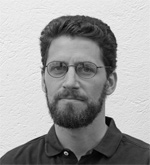 Luigi d’Ayala Valva (1976, Livorno, Italy) is a brother of the Monastic Community of Bose. After his studies of Ancient Greek history and literature in Pisa, he entered at the Monastery of Bose in 2001, where ever since he continued his research mainly in the field of patristics and monastic literature, with special reference to the ancient and byzantine tradition. Along with his scholarly and editorial activity, he charged with the formation of the novices and is member of the scientific board of the annual International Ecumenical Conference on Orthodox Spirituality, which is held in Bose since 1992, in collaboration and with the patronage of different Orthodox Churches. He is also member of the A.I.E.P. (Association Internationale Etudes Patristiques). Among his publications, the Italian translation and commentary of some of the main texts of the ancient monastic tradition: the Heavenly Ladder of St John Climacus, the Little Catecheses of St Theodore the Studite, the Sayings of the Desert Fathers. He is currently publishing the Life of St Athanasius the Athonite.
Luigi d’Ayala Valva (1976, Livorno, Italy) is a brother of the Monastic Community of Bose. After his studies of Ancient Greek history and literature in Pisa, he entered at the Monastery of Bose in 2001, where ever since he continued his research mainly in the field of patristics and monastic literature, with special reference to the ancient and byzantine tradition. Along with his scholarly and editorial activity, he charged with the formation of the novices and is member of the scientific board of the annual International Ecumenical Conference on Orthodox Spirituality, which is held in Bose since 1992, in collaboration and with the patronage of different Orthodox Churches. He is also member of the A.I.E.P. (Association Internationale Etudes Patristiques). Among his publications, the Italian translation and commentary of some of the main texts of the ancient monastic tradition: the Heavenly Ladder of St John Climacus, the Little Catecheses of St Theodore the Studite, the Sayings of the Desert Fathers. He is currently publishing the Life of St Athanasius the Athonite.